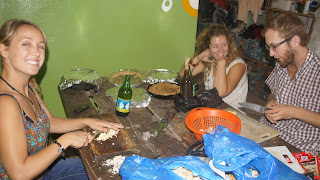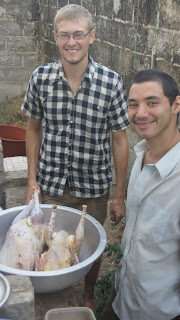The view and opinions expressed on this site are my own and do not reflect the goals or intents of the US government, The Senegalese government or The Peace Corps. I alone am responsible for the content of this blog.
Wednesday, July 11, 2012
Pulaar and Wolof (But French Just In Case)
Friday, December 9, 2011
Trainings and Such
 Part of being a Peace Corps volunteer is finding that imperfect balance between the amount of work you execute (e.g. number of trees grown/planted) and the amount executed by host-country nationals (HCN). It would be very easy to grow a bunch of trees myself and then hand them out or just go plant orchards on my own. I wouldn't have the back and forth trying to determine what the HCN really wanted to do. I wouldn't have to make sure they attended the training at every step, and then executed every step correctly. But the more work I take on, the less likely it is to continue on after I leave or after Peace Corps leaves the community. Trees might be considered "Amadou's (that's me) trees" and won't be cared for. HCNs might expect from my replacement the same handouts I gave during my service. (To the left is my back yard and the trees I have in my nursery).
Part of being a Peace Corps volunteer is finding that imperfect balance between the amount of work you execute (e.g. number of trees grown/planted) and the amount executed by host-country nationals (HCN). It would be very easy to grow a bunch of trees myself and then hand them out or just go plant orchards on my own. I wouldn't have the back and forth trying to determine what the HCN really wanted to do. I wouldn't have to make sure they attended the training at every step, and then executed every step correctly. But the more work I take on, the less likely it is to continue on after I leave or after Peace Corps leaves the community. Trees might be considered "Amadou's (that's me) trees" and won't be cared for. HCNs might expect from my replacement the same handouts I gave during my service. (To the left is my back yard and the trees I have in my nursery). My first training was establishing a cashew tree pepineer (Pictured Left). This included preparing the soil mixture, filling the black plastic tree sacks, treating the seeds, and setting up a nursery site. With trees started in the nursery you can get them growing a month or two before the rains are established, so they are already healthy and strong before outplanting, when they can really take off.
My first training was establishing a cashew tree pepineer (Pictured Left). This included preparing the soil mixture, filling the black plastic tree sacks, treating the seeds, and setting up a nursery site. With trees started in the nursery you can get them growing a month or two before the rains are established, so they are already healthy and strong before outplanting, when they can really take off. Malaria killed 780,000 people worldwide last year and continues to be a serious issue in Senegal. In my host family alone 6 people contracted malaria this year alone. PC Senegal has made great strides in bed net distribution and preventative action. I completed two trainings on preparing mosquito repellant based on leaves of the locally available neem tree. You simply boil the water; add leaves, oil and soap, and then stir to cool. The lotion is quite effective and inexpensive. This was my best-attended training.
Malaria killed 780,000 people worldwide last year and continues to be a serious issue in Senegal. In my host family alone 6 people contracted malaria this year alone. PC Senegal has made great strides in bed net distribution and preventative action. I completed two trainings on preparing mosquito repellant based on leaves of the locally available neem tree. You simply boil the water; add leaves, oil and soap, and then stir to cool. The lotion is quite effective and inexpensive. This was my best-attended training. The following day my host mother Jennaba (right), my friend and workpartner Moussa (left), and my namesake Amadou (center) got together to try out the process and make the lotion themselves. I'm told another who attended the training is now making it and selling it in the bigger city of Velingara.
The following day my host mother Jennaba (right), my friend and workpartner Moussa (left), and my namesake Amadou (center) got together to try out the process and make the lotion themselves. I'm told another who attended the training is now making it and selling it in the bigger city of Velingara.Monday, September 19, 2011
Parc National Niokolo-Koba
And then he went to the trunk to get a tire iron...
Thursday, September 8, 2011
"But neither did I...I haven't once..."
It’s funny the little routines we get into to deal with what are very clearly challenging circumstances. We accommodate others that we know might be having a tough time just so that they have a shed of sanity to hold onto when times are especially trying.
The last month here in Senegal has been underscored by the Islamic holy time of Ramadan. From Sun up until Sun down Muslims around the world are not supposed to eat or drink. Muslims are also not supposed to swallow their saliva, so spitting out the window can get to comical proportions in a cramped 7-place traveling across country. Exceptions are made for the children, sick, pregnant, and breast-feeding. This has been a bit of stressful time for the people here in Senegal, as tempers can grow short around 6:30pm when you haven’t eaten all day.
In my household Ramadan has meant that at around 5am my family gets up and has an extra early breakfast before sunrise. The electricity even comes on especially for that hour from 5am to 6am. Not fasting myself, I’ve continued on my regular wake cycle of around 7/7:30 and eating breakfast around 9:30/10. Lunch tends to be a little later around 2:30/3 with the children making up the majority of the company and my sister of 25 years, Julde, cooking. Around 7:15pm or so the sun drops from the sky and it is time to break the fast that has weighed so heavy through the afternoon. For fast breaking we have one of my favorite dishes, mony, consisting of pounded millet, kosam (a spoiled milk yogurt sort of treat), sugar, and, if we’re lucky, some citrus juice. Normally if someone has not fasted during the day he won’t partake in the family drinking of mony. The fast breaking then pushes dinner back to a later hour of between 10 or 11pm, and we make the switch from a rice base to a lecciri base (pound corn or millet like couscous).
The other day I was working in my back yard doing some weeding around my tomato plants when I noticed the time was approaching for fast breaking. I put a shirt on and walked through my hut and toward the batiment (cement main house in the compound) to meet my 6-year old sister Yebbe coming out to get me. She took one look at me and turned back to open door, “Nee, o ara (Mom, he’s coming).” At the door my mom Jenaba met me with the usual bowl of mony but only one spoon. “Handi, be horanii. O woni fii aan tan (Today, they didn’t fast. This is for you only.)”
















